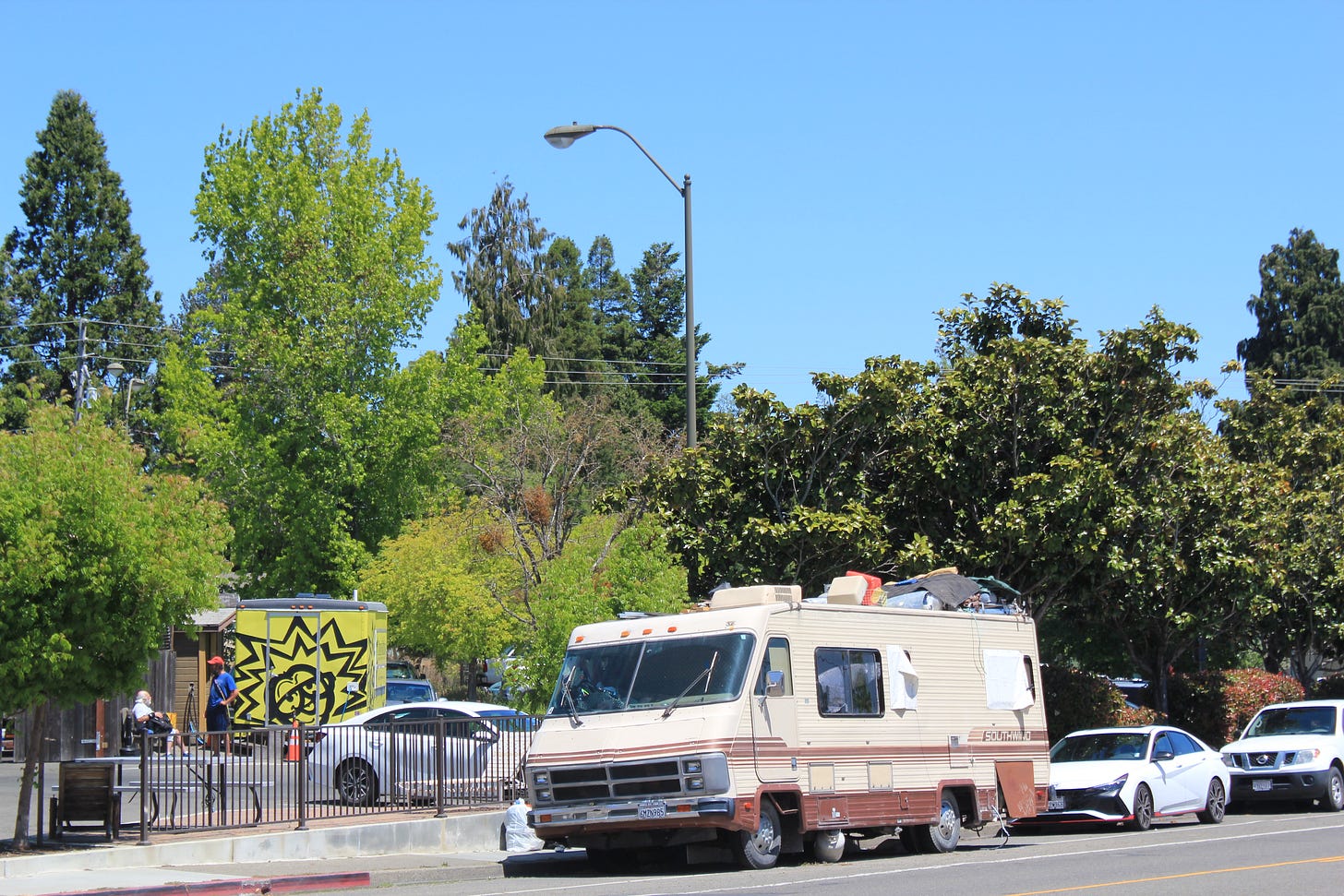Why isn’t the city cracking down on homeless RV parking?
Sebastopol has paused ordinance enforcement as Supreme Court mulls related case

You’ve probably noticed the proliferation of homeless RV camping in Sebastopol recently. As of yesterday, five RVs were parked on Highway 116 outside of what was once Horizon Shine Village, and a handful of others remain scattered around town.
The City of Sebastopol has noticed that you’ve noticed.
“We get multiple emails every day,” said City Attorney Larry McLaughlin, “saying ‘We got RVs here, and people are just living in them. You have an RV ordinance, and they're directly violating it. Why aren’t you guys doing something?’”
After all, the City Council did pass Ordinance No. 1136 in November of 2021, effectively banning RV parking/camping for any extended period of time within city limits. (See the full ordinance here.)
So…what’s going on?
“A temporary moratorium”
After the enactment of Ordinance No. 1136, the American Civil Liberties Union Foundation of Northern California (ACLUNC), along with Legal Aid of Sonoma County, Disability Rights Advocates, and California Rural Legal Assistance, Inc., sued the city on behalf of five plaintiffs—four of whom were homeless Sebastopol residents, and one of which was the nonprofit, Sonoma County Acts of Kindness.
The suit makes 14 claims against Sebastopol, alleging that its ordinance “violates the Eighth Amendment ban on ‘cruel and unusual punishment’ and excessive fines; violates the Fourteenth Amendment’s guarantees of equal protection of the laws and due process; amounts to ‘state created danger;’ permits unreasonable seizures in violation of the Fourth Amendment; is void for vagueness; violates the fundamental right of freedom of travel; violates analogous provisions of the California Constitution; and violates federal and state laws protecting persons with disabilities.”
As a result of the suit, Sebastopol and the ACLUNC have spent the past year involved in court-ordered settlement discussions.
According to Sebastopol Chief of Police Ron Nelson, the city “has agreed to a temporary moratorium on the ordinance’s enforcement” as a part of these ongoing negotiations. ACLUNC Senior Counsel William S. Freeman has confirmed this.
According to McLaughlin, Sebastopol has also agreed to give the ACLUNC 30 days’ notice if the city ever decides to enforce the ordinance again—at which point the ACLUNC has said they would seek an injunction to stop that enforcement. This would burden the city financially, making that scenario unlikely.
All eyes on Grants Pass
McLaughlin also said the ACLUNC has agreed not to move forward with its case until the Supreme Court releases its ruling on City of Grants Pass v. Johnson, a case that was heard just a couple of weeks ago. It’s one that dozens of cities across California and the West Coast, including Sacramento and San Francisco, are watching very closely.
After Grants Pass, an Oregon town with nearly 40,000 residents, saw an increase in homeless people camping in public, locals worried that tourists who support a large part of the town’s economy would be scared away—in much the same way that The Barlow’s business owners fretted over RVs parked on Morris Street three years ago.
When Grants Pass started fining people as a potential solution to the problem, they were sued by the National Homelessness Law Center and others. When the Grants Pass case reached the U.S. Court of Appeals for the Ninth Circuit, that court sided with the plaintiffs, as they did in a 2018 decision, Martin v. Boise.
Martin v. Boise states that while a city can restrict a person from sitting, sleeping, or lying on public property depending on the time and place, it cannot enforce anti-camping ordinances on the homeless population if they are not provided with the option of shelter.
The Supreme Court’s decision on Grants Pass v. Johnson could challenge this approach. Given the court’s conservative majority, they could rule in favor of Grants Pass, which could make the criminalization of chronic public camping okay under federal law moving forward.
The ACLUNC is waiting on the Grants Pass decision because it shares key similarities with Sebastopol’s.
Both cases were filed by homeless residents of their respective towns. Both cases hinge most critically on an interpretation of the Eighth Amendment to the U.S. Constitution, which bans cruel and unusual punishment.
The ACLUNC’s case states that a “government cannot impose criminal penalties on indigent persons for sitting, sleeping, or lying outside on public property…so long as those persons do not have access to shelter.” It goes on to highlight the absence of homeless shelters in the city.
Since the Grants Pass case may redefine what the Eighth Amendment does or does not apply to, negotiations between the city and the ACLUNC are all but stalled.
And even if the Supreme Court rules in favor of Grants Pass, the case against Sebastopol may not be dismissed. After all, the ACLUNC’s lawsuit includes 13 other claims.
“I’ve been told by our outside legal counsel to expect the Supreme Court to rule in late July,” McLaughlin said. “In the meantime, the city's case with the ACLU…is basically going to sit there.”
So too will the RVs on 116 and elsewhere in town.



Sigh, not in my back yard covers so many subjects.
A person works hard enough to afford a vehicle, buy insurance and fuel, but we citizens can spare no area with facilities to park, have water and waste, and electricity.
I am more embarrassed by lack of civility of we “land owners” than the people struggling to exist.
Take some of our transient occupancy tax revenue and build a facility (I’m being ironic)
With climate change there will be more and not less desperate people.
We are misers if this can’t be solved by villages and the county.